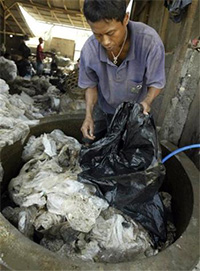Officials: Poor nations can't manage toxic waste
by Michael Casey, The Associated Press
 |
 |
 |
 |
| |
 |
|
| |
An Indonesian man collects plastic items for recycling at a dump in Denpasar, Bali, Indonesia, Tuesday, June 24, 3008. The Ninth Meeting of the Conference of the Parties to the Basel Convention is held on the resort island of Bali to focus on the impacts of hazardous waste on human health.
(AP Photo/Firdia Lisnawati)
|
|
 |
 |
 |
|
| |
26 June 2008 (Bali, Indonesia) – The world's poorest nations are unable to manage the mountains of toxic waste flowing in for disposal from rich countries because of a lack of resources and political will, officials said Wednesday.
Katharina Kummer Peiry, the executive secretary of a UN convention on hazardous waste disposal, said the dumping of everything from hazardous chemicals to electronic waste from televisions and computers in poor countries is a growing problem.
She blamed it mostly on the inability of poor nations to finance better enforcement and monitoring of waste coming into their ports.
"The problem lies in the lack of interest and lack of resources on the issue at all levels," Peiry said.
The warning comes as delegates from as many as 170 countries meet on the Indonesian island of Bali to discuss how they can strengthen the U.N.-administered Basel Convention on the Control of Transboundary Movements of Hazardous Wastes and their Disposal, adopted in 1989. The meeting ends Friday.
The extent of the problem was illustrated in 2006, when hundreds of tons of toxic waste were dumped around Ivory Coast's main city of Abidjan, killing at least 10 people and sickening tens of thousands more. The waste came from a tanker chartered by the Dutch commodities trading company Trafigura Beheer BV, which turned to Africa after disposal costs in Amsterdam were deemed too expensive.
The ship found a local company in Ivory Coast that agreed to dispose of the waste. But it lacked proper facilities and allegedly dumped the waste around the city at night. Trafigura has agreed to pay $236 million to the Ivorian government but has denied responsibility.
Many African countries at the Bali meeting said they are unable to manage the influx of hazardous waste and are already overwhelmed by their own piles of used computers and cell phones.
"There is a need to reduce the export of toxic waste into Africa," said Dr. O.O. Dada, director of Nigeria's Department of Pollution Control and Environmental Health. "It's causing a lot of health problems, environment problems. The region is wondering why we have to do this when we have our own problems."
Critics say the Ivory Coast case highlights the limitations of the convention. Although it requires a country to seek the consent of another government when exporting waste and allows a country to ban the import of waste, it stops short of an outright export ban.
An amendment calling for a ban was first proposed in 1995, but not enough of the convention's 170 member countries have ratified it. A ban is likely to be debated in Bali on Thursday when environmental ministers begin discussing the convention.
Opponents including the U.S. say a ban would be unfair to developing countries that have established environmentally sound recycling industries.
But supporters including the European Union say it would ensure exporters take responsibility for their own hazardous waste.
Jim Puckett, coordinator of the Seattle-based Basel Action Network, said the convention is "on the cusp of becoming a paper tiger" without an export ban.
"This meeting is very important to decide which way it will go," he said.
FAIR USE NOTICE. This document contains copyrighted material whose use has not been specifically authorized by the copyright owner. The Basel Action Network is making this article available in our efforts to advance understanding of ecological sustainability and environmental justice issues. We believe that this constitutes a 'fair use' of the copyrighted material as provided for in section 107 of the US Copyright Law. If you wish to use this copyrighted material for purposes of your own that go beyond 'fair use', you must obtain permission from the copyright owner.
More News
|